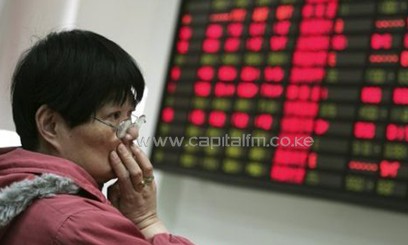
A woman going through the stocks/FILE
HONG KONG, Jun 20 – Asian markets sank on Thursday, following a sell-off on Wall Street, after the Federal Reserve indicated it would start easing back on its multi-billion-dollar stimulus drive this year.
Adding to selling pressure was preliminary data on Chinese manufacturing from HSBC, which showed activity contracted again in June and was at a nine-month low.
Tokyo shed 1.74 percent, or 230.64 points, to end at 13,014.58, Seoul tumbled 2.00 percent, or 37.82 points, to close at 1,850.49 and Sydney sank 2.12 percent, or 103.0 points, to 4,758.4.
Hong Kong sank 2.85 percent, or 598.27 points, to 20,388.62 and Shanghai fell 2.77 percent, or 59.43 points, to 2,084.02 as dealers digested the manufacturing figures.
The Fed’s policy-making committee said Wednesday the economy continued to grow at a “moderate” pace but would maintain its $85-billion-a-month bond-buying programme, citing high unemployment and the negative impact of government spending cuts.
However, chairman Ben Bernanke said afterwards “the committee currently anticipates that it would be appropriate to moderate the monthly pace of purchases later this year” if the economic outlook continues to improve.
Stressing that “our purchases are tied to what happens in the economy”, he said most members of the committee foresaw tapering in the coming months.
The announcement sent US stocks tumbling — the Dow fell 1.35 percent, the S&P 500 lost 1.39 percent and the Nasdaq tumbled 1.12 percent — while the yield on US Treasuries jumped.
“The Fed’s result was not out of line with expectations,” said SMBC Nikko Securities general manager of equities Hiroichi Nishi.
“Some transparency as to the possible end of US easing is the biggest takeaway. Players can now factor this into investment strategies. Wall Street’s fall will act as a short-term negative against the larger beneficial effect of a weaker yen.”
In currency dealing, the dollar jumped back towards 100 yen, with likely Fed tightening meaning there is less cash being pumped into the system, which in turn lifts demand. In New York Wednesday it ended at 96.39 yen, well up from 95.05 yen earlier in the day in Asia. And on Thursday it rallied again, buying 98.23 yen.
The euro bought 129.82 yen and $1.3216 in Asia compared with 128.24 yen and $1.3297.
Global markets have been sent into turmoil in recent weeks as dealers priced in a possible end to the bond-buying, known as quantitative easing.
The programme had helped fuel a rally in equities since the Fed said in September it would provide vast sums of cash until the world’s biggest economy showed signs it was back up to strength.
Numerous data out of the United States in the past months have pointed to a healthy recovery.
In China, British banking giant HSBC said its preliminary purchasing managers’ index (PMI) came in at 48.3, worse than May’s final reading of 49.2 and its lowest since September.
A reading below 50 indicates contraction, while anything above signals expansion.
The news adds to growing concerns about the strength of the world’s number two economy, which is a major driver of growth for the region.
Zhang Zhiwei, economist at Nomura International in Hong Kong, said in a report that “the fall reinforces our concerns over the downside risks to the economy”.
Oil prices eased, with New York’s main contract, light sweet crude for delivery in July, down $1.28 at $96.96 a barrel on its last day of trading, while Brent North Sea crude for August shed $1.36 to sit at $104.76.
Gold was at $1,310.67 at 0807 GMT from $1,367.80 late Wednesday.


































